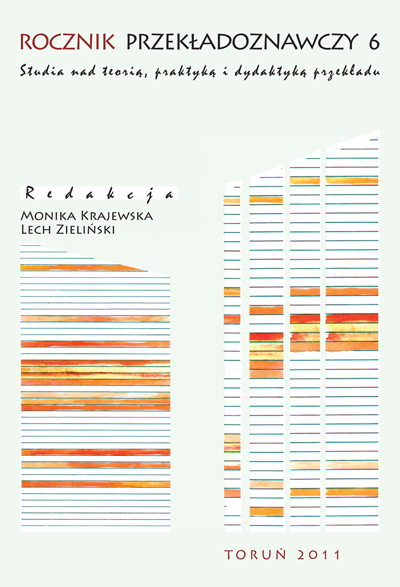Models of training translators in the field of specialist legal knowledge
DOI:
https://doi.org/10.12775/RP.2011.012Keywords
translation didactics, training translators, written translation, legal translationAbstract
The aim of this paper is to present and discuss the existing models of training future translators specialising in legal texts at the university level. The analysed programmes were selected from undergraduate teaching programmes included in the European Master’s in Translation (EMT) project. Due to specific solutions in the field of teaching legal translation, other programmes encompassing the specificity of legal translation are taken into account. As far as future translators specialising in legal translation are concerned, four components of teaching programmes seem to be important: the translator training curriculum, the significance of legal translation and other related subjects in the curriculum, and, finally, the profiles of the trainer and the student. It should be emphasised that each of these components plays an important role in the development of the programmes designed to educate professional translators. What is more, taking into consideration the above research criteria, four models of teaching can be distinguished that are based on the distinction between two basic components of teaching programmes, i.e., the legal part and the translation. All four models are described and analysed providing the account of the two abovementioned components as well as their relation to the overall translator training curriculum. The analysis leads to the conclusion that four models of education in the field of legal translation can be observed, i.e. the translation model, translation model with basic legal background, translation model with extended legal background and, finally, the legal model.
References
Blais, F., 2008, „La maîtrise en traduction juridique”, referat wygłoszony podczas Journée scientifi que „La langue et le droit”, Gatineau, http://www.realiter.net/spip.php?article1644 (dostęp: 6 października 2008 r.).
Bocquet, C., 2008, La traduction juridique. Fondement et méthode, Bruxelles.
Caminade, M., Pym, A., 1998, „Translator-Training Institutions”, [w:] M. Baker, Encyclopedia of Translation Studies, London–New York, s. 280–285.
Damette, E., 2007, Didactique du français juridique. Français langue étrangère à visée professionnelle, Paris.
de la Fuente, E., 2000, „Les enjeux de l’enseignement de la traduction juridique”, [w:] La traduction juridique. Histoire, théorie(s) et pratique, Genève, s. 223–232.
Gilbert, J.-B., 2008, „La double formation en français sur objectif spécifique: atout ou nécessité?”, [w:] Le français de spécialité. Enjeux culturels et linguistiques, O. Bertrand, I. Schaff ner (red.), Palaiseau, s. 251–264.
Nord, Ch., 2005, „Training functional translators”, [w:] Training for the new millennium: pedagogies for translation and interpreting, M. Tennent (red.), Amsterdam, s. 209–224.
Northcott, J., Brown G., 2006, „Legal translator training: Partnership between teachers of English for legal purposes and legal specialists”, English for Specific Purposes, nr 25, s. 358–375.
Petrits, A., 2007, „Le master européen de traduction: un projet de la direction générale de la traduction de la Commission européenne”, Meta, vol. 52, nr 1, s. 85–92.
Piotrowska, M., 2007, Proces decyzyjny tłumacza. Podstawy metodologii nauczania przekładu pisemnego, Kraków.
Płusa, P., 2007, Rozwijanie kompetencji przekładu i kształcenie tłumaczy, Katowice.
Šarčević, S., 2000, New Approach to Legal Translation, The Hague–London–Boston.
Šarčević, S., 2005, „The Quest for Legislative Bilingualisme and Multilingualisme. Co-drafting in Canada and Switzerland”, [w:] Jurilinguistique: entre langues et droits, J.-C. Gémar, N. Kasirer (red.), Bruxelles, s. 277–291.
Sawicki, M.T., 2009, „Legal English”, Kancelaria, nr 13, s. 34.
Snow, G., 2003, „L’indispensable recherche jurilinguistique et ce qu’elle permet d’apprendre du droit”, Revue de la common law en français, vol. 5, nr 1, s. 211–219.
Downloads
Published
Issue
Section
Stats
Number of views and downloads: 625
Number of citations: 0



